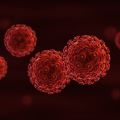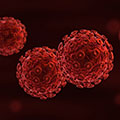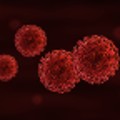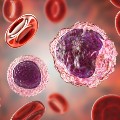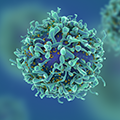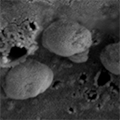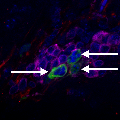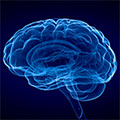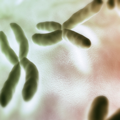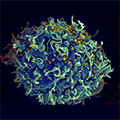Science Updates About HIV/AIDS
- Researchers Investigate Potential Treatment for Eliminating HIV from the Brain
-
In a recent NIMH-funded study, researchers explored a potential new way of clearing HIV from the brain by testing a drug that targets a type of immune cell known as macrophages.
- Decades of Dedication and Collaboration: Unraveling the HIV Mystery
-
• 75th Anniversary
In celebration of NIMHs 75th anniversary, we reflect on decades of work by the institute to understand and eradicate HIV.
- Dr. Lisa Bowleg Named James S. Jackson Memorial Award Winner
-
The National Institute of Mental Health (NIMH) has named applied Social Psychologist Lisa Bowleg, Ph.D., M.A., the 2023 James S. Jackson Memorial Award winner.
- Blocking HIV Enzyme Reduces Infectivity and Slows Viral Rebound
-
In this NIMH-funded study, researchers developed a compound that blocked an enzyme critical for forming HIV particles, which stopped the virus from correctly forming and becoming infectious.
- HIV Can Persist for Years in Myeloid Cells of People on Antiretroviral Therapy
-
A subset of white blood cells, known as myeloid cells, can harbor HIV in people who have been virally suppressed for years on antiretroviral therapy, according to findings from a small study supported by the National Institutes of Health.
- Breaking Down Barriers to HIV Medication Access
-
Researchers investigated whether home delivery of ART for a modest fee could help improve ART access and use, finding it resulted in increased viral suppression in participants compared with clinic-based medication distribution.
- Long-acting antiretroviral therapy suppresses HIV among people with unstable housing, mental illnesses, substance use disorder
-
A long-acting antiretroviral treatment given every four to eight weeks, and delivered with comprehensive support services, suppressed HIV in people who were previously not virologically suppressed.
- Barriers and Supports to HIV Prevention Among Young Women in Kenya
-
In a qualitative study supported by NIMH, researchers identified barriers and supports to Kenyan women’s use of PrEP, a highly effective medication to reduce HIV transmission.
- T Cells Help HIV Enter and Persist in the Brain
-
A recent NIMH-supported study sheds light on the role of a unique set of T cells in trafficking HIV infection into the brain and mediating the virus’ persistence there.
- Researchers Use Exosome-Based Strategy to Block HIV in Mice
-
In this NIMH-funded study, researchers used exosomes to deliver novel protein into the cells of mice infected with HIV. The protein attached to HIV’s genetic material and prevented it from replicating, resulting in reduced levels of HIV in the bone marrow, spleen, and brain.
- Partner Violence and Elevated HIV Viral Load in South African Women
-
New analysis suggests an association between intimate partner violence and elevated viral loads among postpartum women in South Africa.
- Brain Cells Can Harbor and Spread HIV Virus to the Body
-
Researchers funded by NIMH have found that astrocytes, a type of brain cell, can harbor HIV and then spread the virus to immune cells that traffic out of the brain and into other organs.
- Novel Method Identifies Patients at Risk for HIV Who May Benefit From Prevention Strategies
-
Researchers have demonstrated the effectiveness of using algorithms that analyze electronic health records (EHRs) to help physicians identify patients at risk for HIV who may benefit from preexposure prophylaxis (PrEP), which significantly reduces the risk of getting HIV.
- Targeted E-Health HIV Intervention Reduces STIs and Sexual Risk Behaviors
-
Findings from a new study suggest an electronically delivered HIV prevention intervention may be effective in reducing sexually transmitted infections (STIs) and sexual risk behaviors in young men who have sex with men.
- Delay in HIV Treatment Associated with Brain Atrophy
-
People infected with the human immunodeficiency virus, known as HIV, display reductions in brain volume compared with people who are not infected with HIV, but now an NIMH-funded study has shed light on the course of this deterioration and shows that antiretroviral treatment started in the first few years of infection may stop these brain changes.
- Potential Source of HIV Persistence Confirmed
-
Scientists have shown that a class of immune cells not thought to be a primary reservoir for HIV can harbor the virus even following antiretroviral treatment (ART).
- Biomarker Tracks Accelerated HIV-Associated Aging
-
By measuring a molecular signature of aging, researchers have found that HIV infection accelerates aging, adding an average of five years to someone’s biological age.
- Experimental Combination Surprises with Anti-HIV Effectiveness
-
A compound developed by NIH-supported scientists to protect the nervous system from HIV surprised researchers by augmenting the effectiveness of an investigational antiretroviral drug beyond anything expected.
- HIV Can Spread Early, Evolve in Patients’ Brains
-
HIV can replicate independently and early in the illness process, genetically evolving differently than in the periphery.
